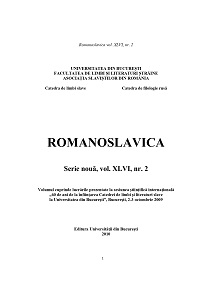Mituri poloneze în „Lilla Weneda” de Juliusz Słowacki
Polish myths in "Lilla Weneda" by Juliusz Słowacki
Author(s): Cristina GodunSubject(s): Polish Literature, Theory of Literature, Drama, Sociology of Literature
Published by: Editura Universităţii din Bucureşti
Keywords: history; myth; symbol; romantism;
Summary/Abstract: The essay traces the Polish romantic myths exploited by Slowacki in the tragedy Lilla Weneda, as well as commentates and deconstructs them in the light of the key-symbols used by the autor. At the core of the tragedy there lies a very fashionable and renowned at that time theory which stated that nations were created by means of wars and blood sacrifices – nine years after the defeat of the Polish insurrection Słowacki offers a new perspective upon the social and political reality of Poland, by simply uncovering and reinterpreting the signification of the national history. To blame for being defeated are several issues: his countrymen’s lack of bravery, fatalism of history, idealisation of the past. Slowacki thinks that victory is still possible only if it were fueled by sacrifice - not individual, but collective. That’s exactly why Słowacki tries to create a monumental myth about the beginning of the Polish national state intertwined with multiple hints to the present moment as well as to the recent past (that is the rebellion in November).
Journal: Romanoslavica
- Issue Year: XLVI/2010
- Issue No: 2
- Page Range: 55-61
- Page Count: 7
- Language: Romanian

